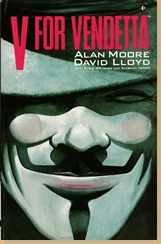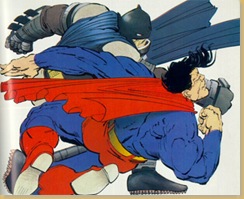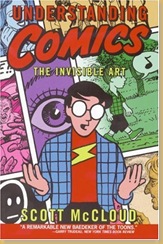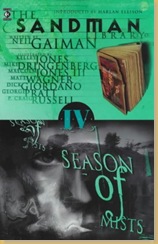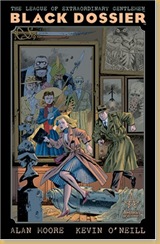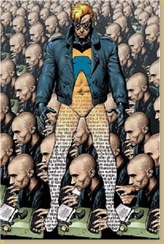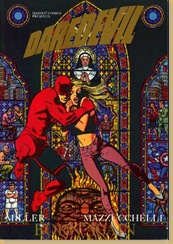Here are a few more of my favorite comics that didn't make the list.
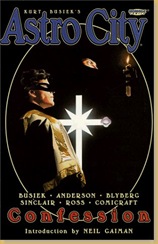 Astro City
Astro City : Astro City by Kurt Busiek and Alex Ross is an amazing accomplishment. By paying close attention to the way comic books have evolved over the years, Busiek created a brand new comic book universe that feels as "lived in" as the mainstream Marvel and DC universes.
: Astro City by Kurt Busiek and Alex Ross is an amazing accomplishment. By paying close attention to the way comic books have evolved over the years, Busiek created a brand new comic book universe that feels as "lived in" as the mainstream Marvel and DC universes.
With this amazing four color backdrop, Kurt Busiek proceeds to tell deeply personal stories. While there are plenty of traditional superheroics going on, the focus of the stories are always more personal. A child feeling neglected who just happens to be part of a super-powered family. An ex-con who is attempting to integrate back into society who just happens to be a former supervillain.
These are great stories. It didn't make my list though because Astro City is too reminiscent of Marvels (also by Busiek and Ross). Heck, the current storyline, Astro City: The Dark Age, was originally pitched to Marvel Comics as the plot for a Marvels II project.
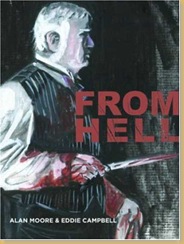 From Hell
From Hell : Alan Moore and Eddie Campell's amazing researched comic book about Jack the Ripper. If you have a chance to pick this up, make sure to pick up the annotated version. Frankly, the amount of research that Alan Moore put into this book is amazing.
: Alan Moore and Eddie Campell's amazing researched comic book about Jack the Ripper. If you have a chance to pick this up, make sure to pick up the annotated version. Frankly, the amount of research that Alan Moore put into this book is amazing.
Despite the research, Alan Moore makes no claims to have "solved" the Jack the Ripper case. In fact, he makes the opposite claim, that the evidence is simply not available to solve the case. Nevertheless, he tells an entertaining tale.
Why didn't it make the list? Well, I have an awful lot of Alan Moore books on the list already. Also, as much as I like the book, Jack the Ripper is a bit overexposed.
Incidentally, if you have seen the movie "From Hell", it is only very loosely based on the comic book. It especially differs in it's portrayal of Inspector Abberline and making it into a whodunit. Not that I didn't enjoy the movie, it was just a very different beast.
"From Hell", it is only very loosely based on the comic book. It especially differs in it's portrayal of Inspector Abberline and making it into a whodunit. Not that I didn't enjoy the movie, it was just a very different beast.
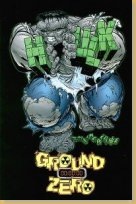 The Incredible Hulk: Ground Zero
The Incredible Hulk: Ground Zero : Peter David and Todd McFarlane brought us this incredibly entertaining story. Written during the grey Hulk era, the hulk is not a simple minded monster that wants to be left alone. Rather he is highly intelligent and actively malevolent.
: Peter David and Todd McFarlane brought us this incredibly entertaining story. Written during the grey Hulk era, the hulk is not a simple minded monster that wants to be left alone. Rather he is highly intelligent and actively malevolent.
As smart and bad as the Hulk is during this era, his enemy the Leader proves to be smarter and worse. The Hulk ends up being trapped in the Leader's web. Despite all odds, the Hulk manages to get the upper hand. Until the Leader cheats. The storyline ends with the Hulk apparently dead and the Leader triumphant. Not necessarily what you would expect.
Why isn't it on my list? Well, as much as I enjoy it, it is also the most standard superhero book. It was fun, but not especially deep. Although in all fairness, it was pretty damn deep for the Hulk!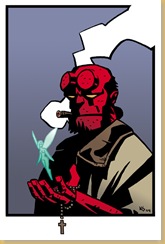
Hellboy : Mike Mignola's masterwork, Hellboy is a strange mixture of pulp adventure, Lovecraftian horror, classic faerie tales (especially Slavic ones), and Nazi menace. It's a mixture that probably shouldn't work, but does. It's a little like Indiana Jones, if Indiana Jones was a 6' tall, red-skinned, demon with a great big right-hand made of stone.
: Mike Mignola's masterwork, Hellboy is a strange mixture of pulp adventure, Lovecraftian horror, classic faerie tales (especially Slavic ones), and Nazi menace. It's a mixture that probably shouldn't work, but does. It's a little like Indiana Jones, if Indiana Jones was a 6' tall, red-skinned, demon with a great big right-hand made of stone.
I was a bit of a latecomer to the Hellboy party, but I have made up for it by collecting every Hellboy story I could find. With it's odd mixture of influences and sense of fun, its sometimes as if Mignolta was writing Hellboy just for me.
I guess I didn't put it on my list because Hellboy is a bit too personal of a comic book for me. All of the books on my top ten list I have no problems recommending to the world. On the other hand I can see Hellboy being a bit off-putting to some people.
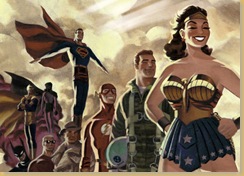 The New Frontier
The New Frontier : Darwyn Cooke's amazing blending of political allegory and superhero comic history. Set in the late 1950's, superheroes are in decline after being investigated by Joseph McCarthy's House Un-American Activities Committee (HUAC).
: Darwyn Cooke's amazing blending of political allegory and superhero comic history. Set in the late 1950's, superheroes are in decline after being investigated by Joseph McCarthy's House Un-American Activities Committee (HUAC).
With the exception of Superman, Batman, and Wonder Woman the Golden Age comic heroes have given up the fight. A new generation of heroes is ready to take it up, but can they overcome the paranoia and mistrust of their own government?
Honestly, this is a great comic which makes great use of Darwyn Cooke's unique style. It was even made into a great animated movie . It would definitely be on my top twenty list, even if it didn't make the top ten.
. It would definitely be on my top twenty list, even if it didn't make the top ten.
 Kraven's Last Hunt
Kraven's Last Hunt : I love Spider-Man. He was my favorite superhero when I was a kid, and the first comic book I ever collected. So I feel a little bad that there were no Spider-Man stories on my top ten list.
: I love Spider-Man. He was my favorite superhero when I was a kid, and the first comic book I ever collected. So I feel a little bad that there were no Spider-Man stories on my top ten list.
If I was going to put one story up there, Kraven's Last Hunt by J.M. DeMatteis and Mike Zeck would probably be it. It is a bit of an odd Spider-Man story in that it doesn't have a lot of Spider-Man in it. In the first issue, Kraven, who was a bit of a second-string villain to this point, goes a bit over the edge after his inability to defeat Spider-Man. He shoots Spider-Man full of drugs, buries him, and then proceeds to take over his identity.
Why isn't it on the list? Well, it may not have aged as well as some of the comics on my list. Many parts of it require a bit of suspension of disbelief to understand the motivations of the villain. I still love it, but I wonder how much of that is because the story is good, and how much of it is because I was a 15 year-old kid who loved Spider-Man when I read this the first time.
Well, that's enough of me musing about my favorite comics for awhile. Hope you all enjoyed this series.
to come out. It's not because he is a huge Forgotten Realms fan. It's so that he can check out the new Swordmage class. He has always been a big fan of the Gish concept, and sees 4th Edition D&D as the first edition of D&D that can handle the concept easily.






